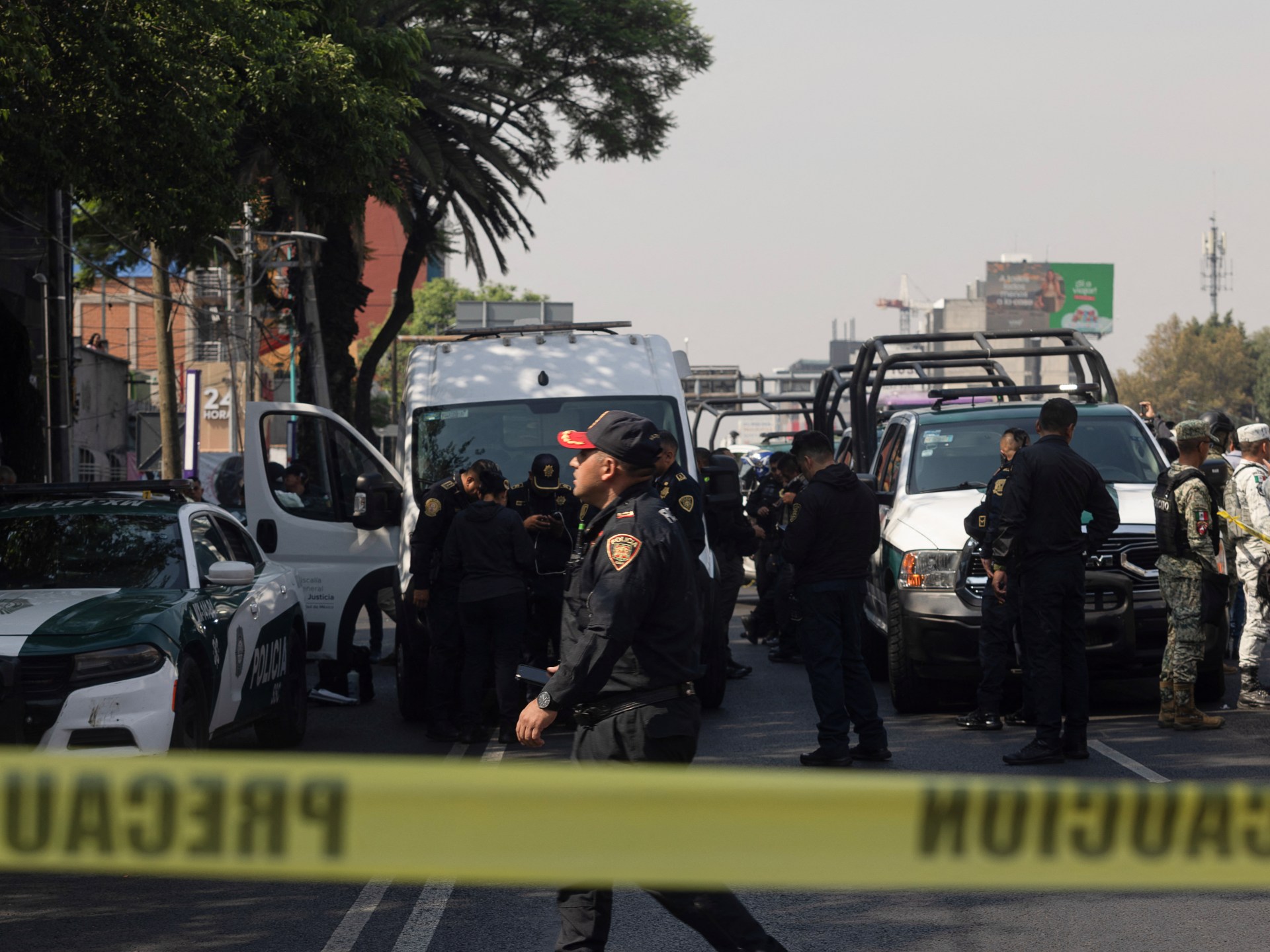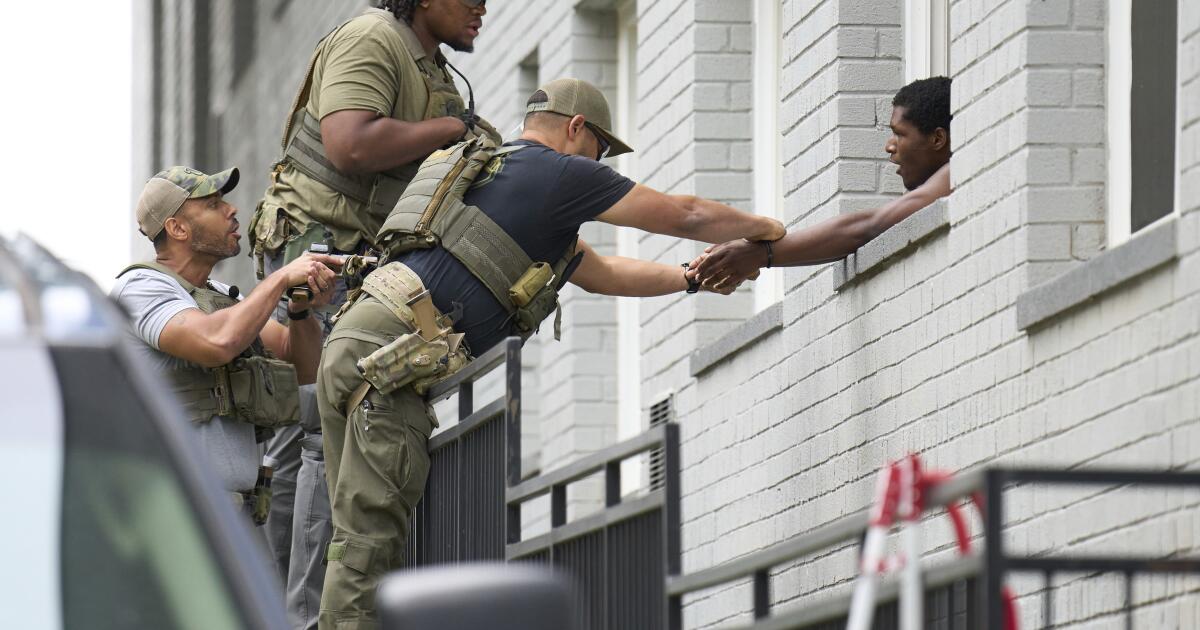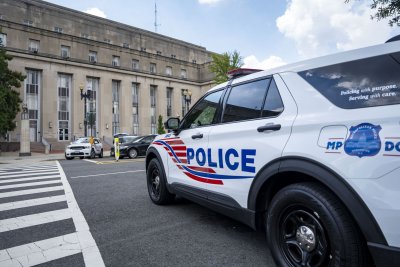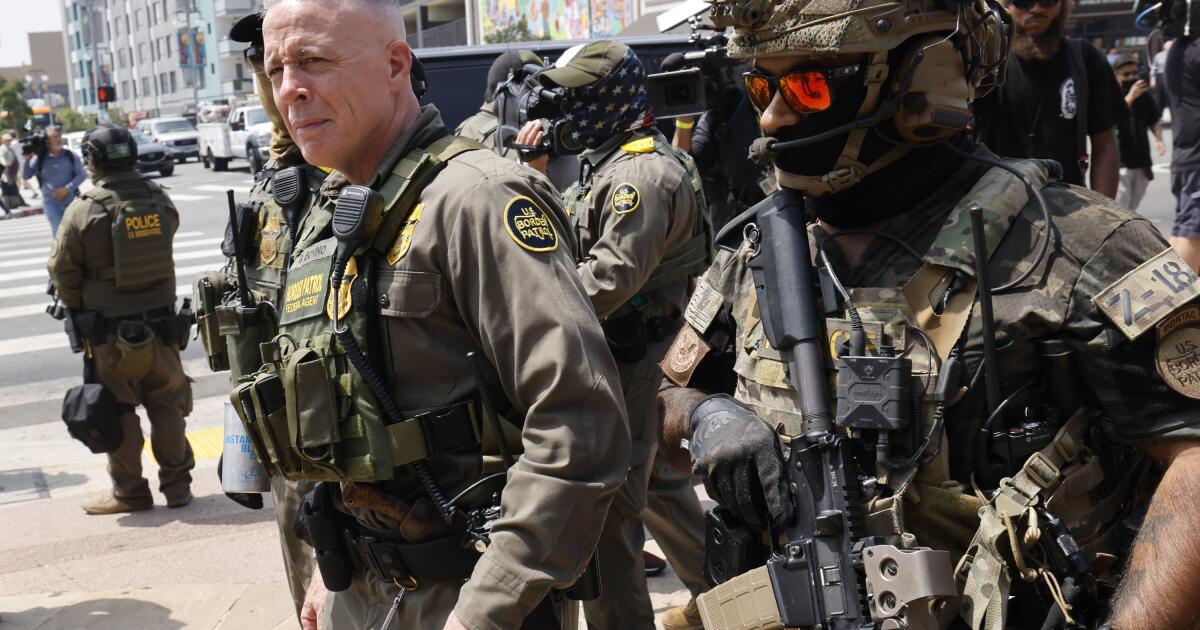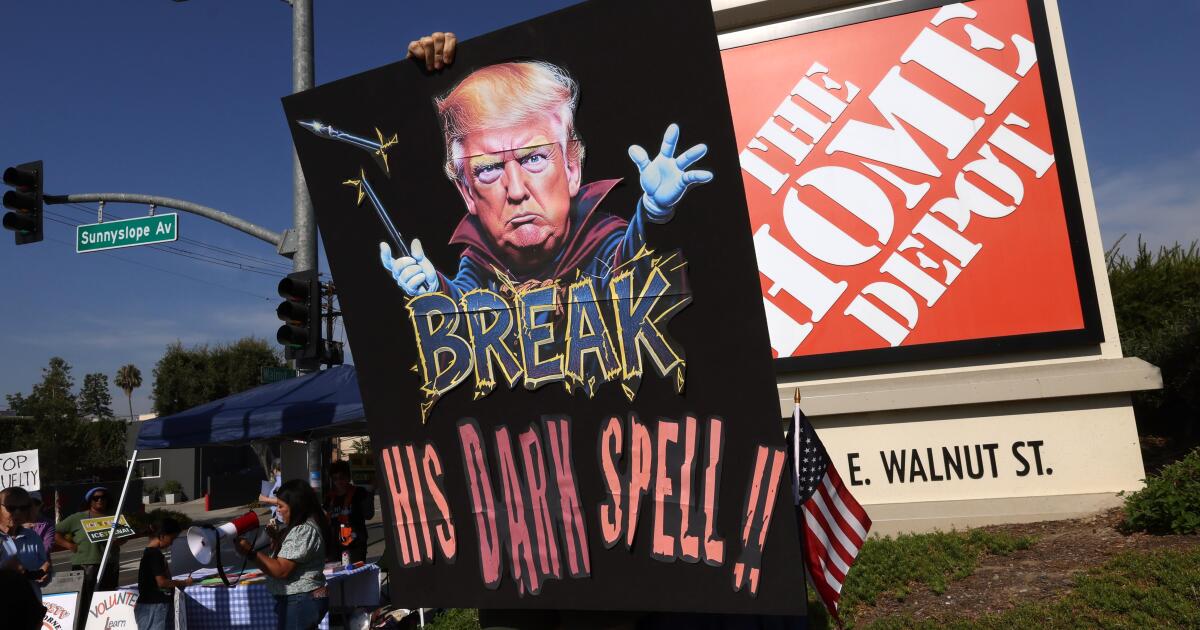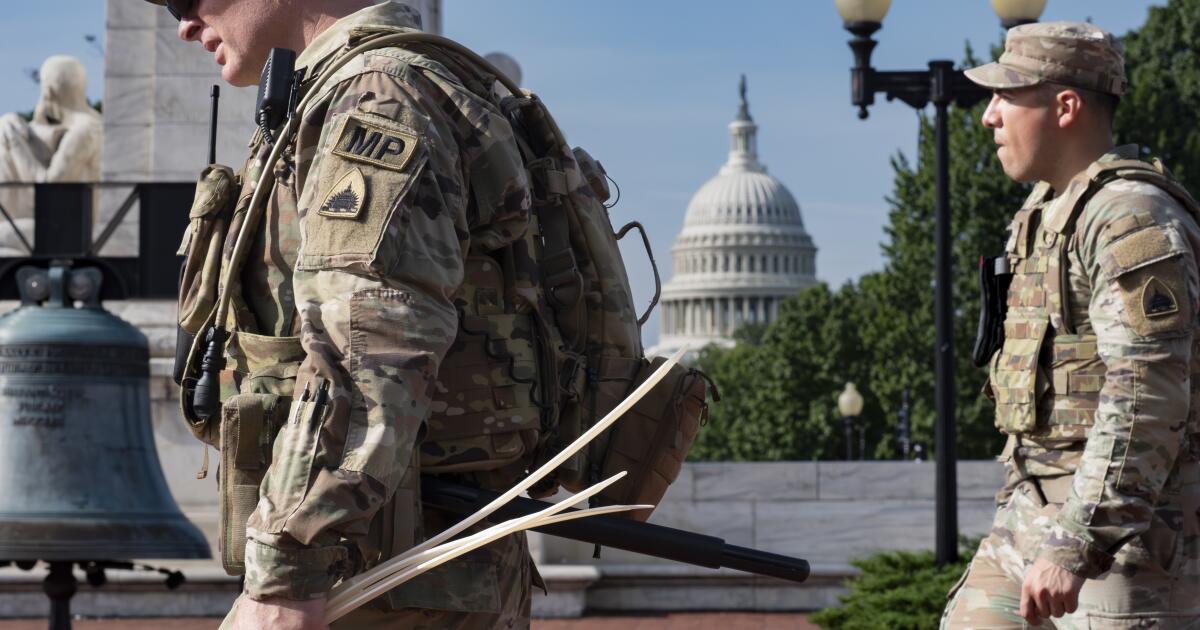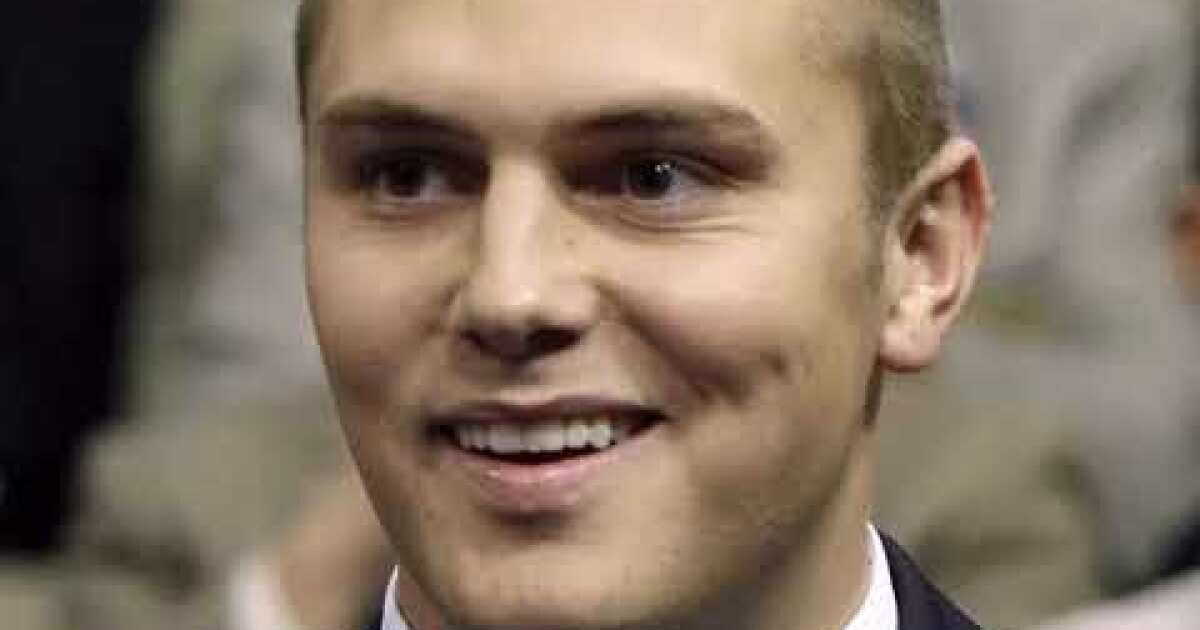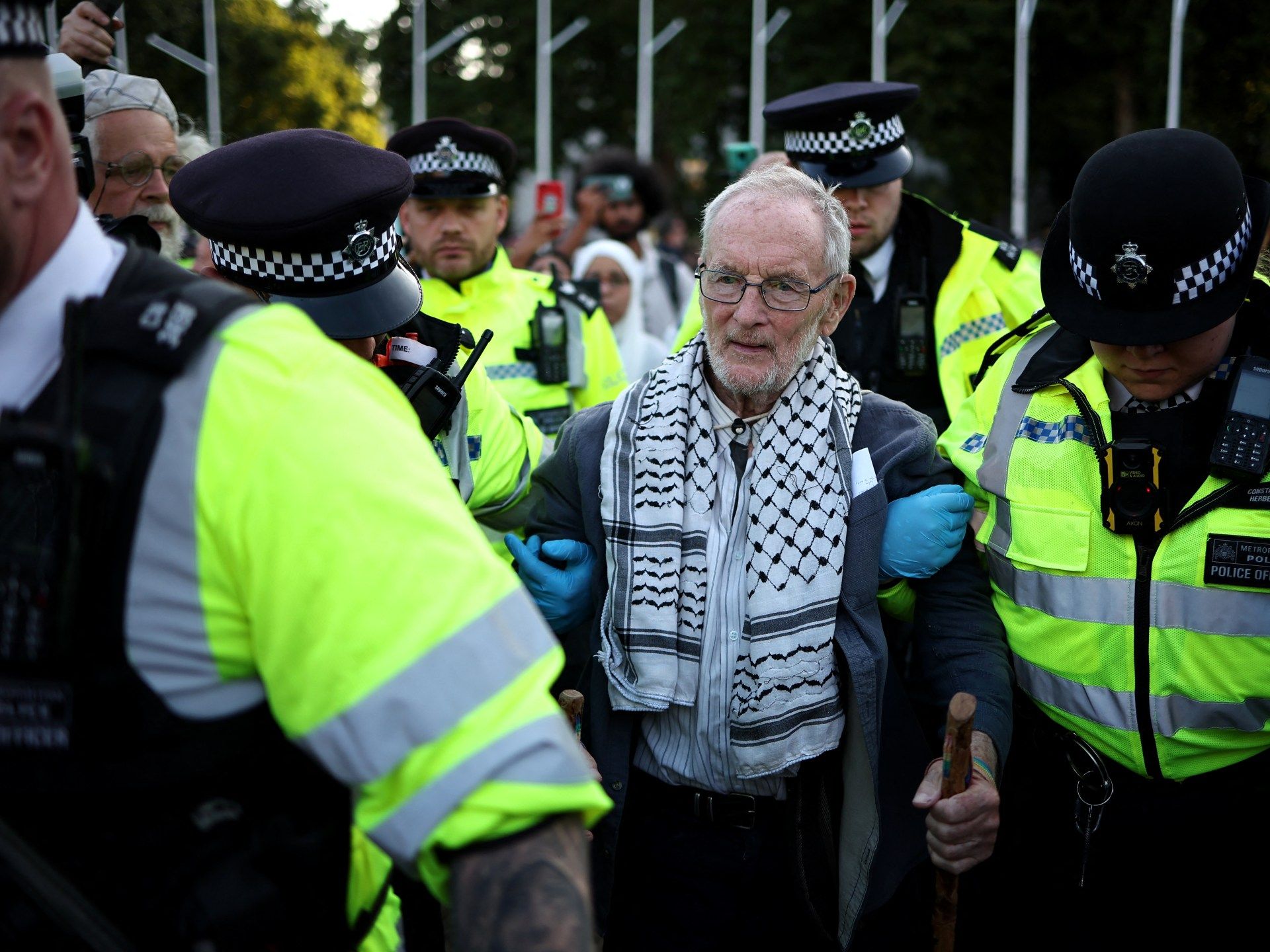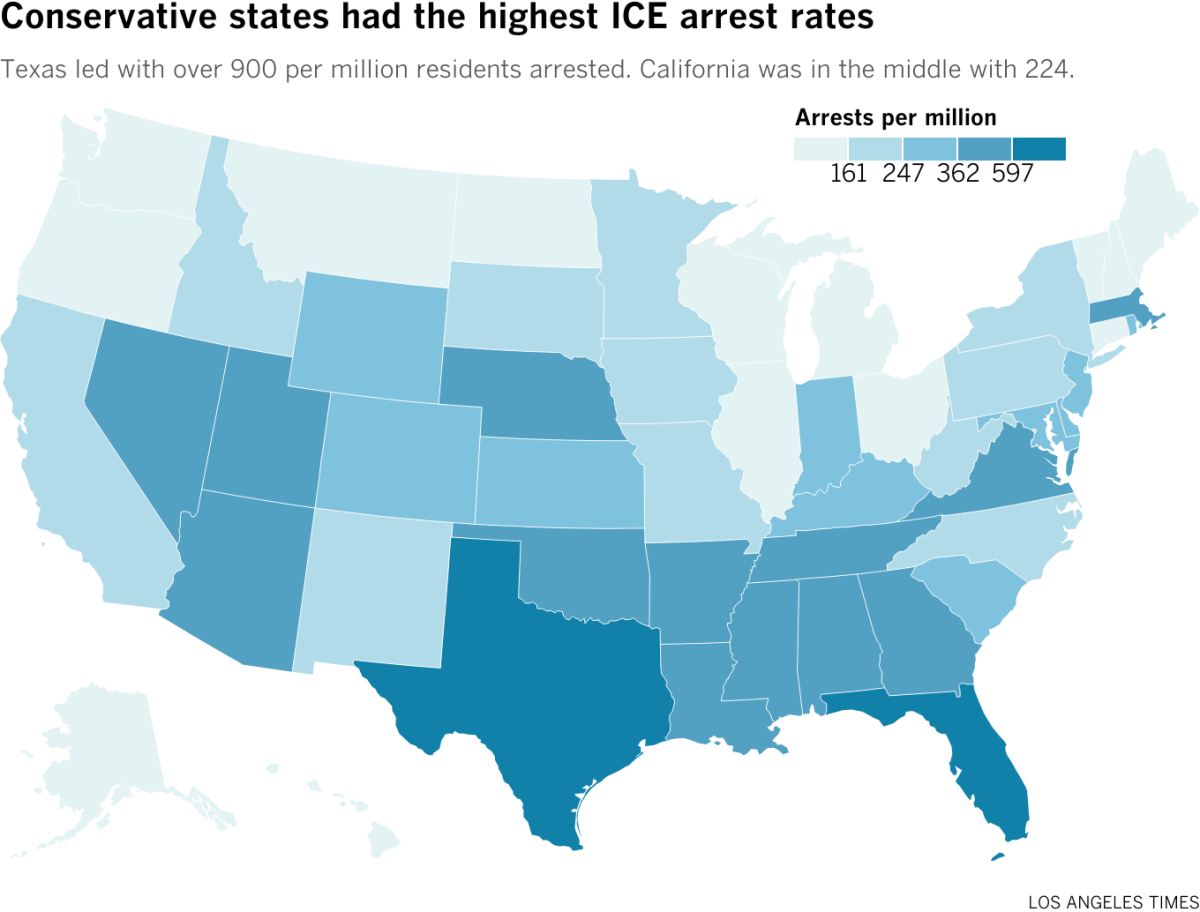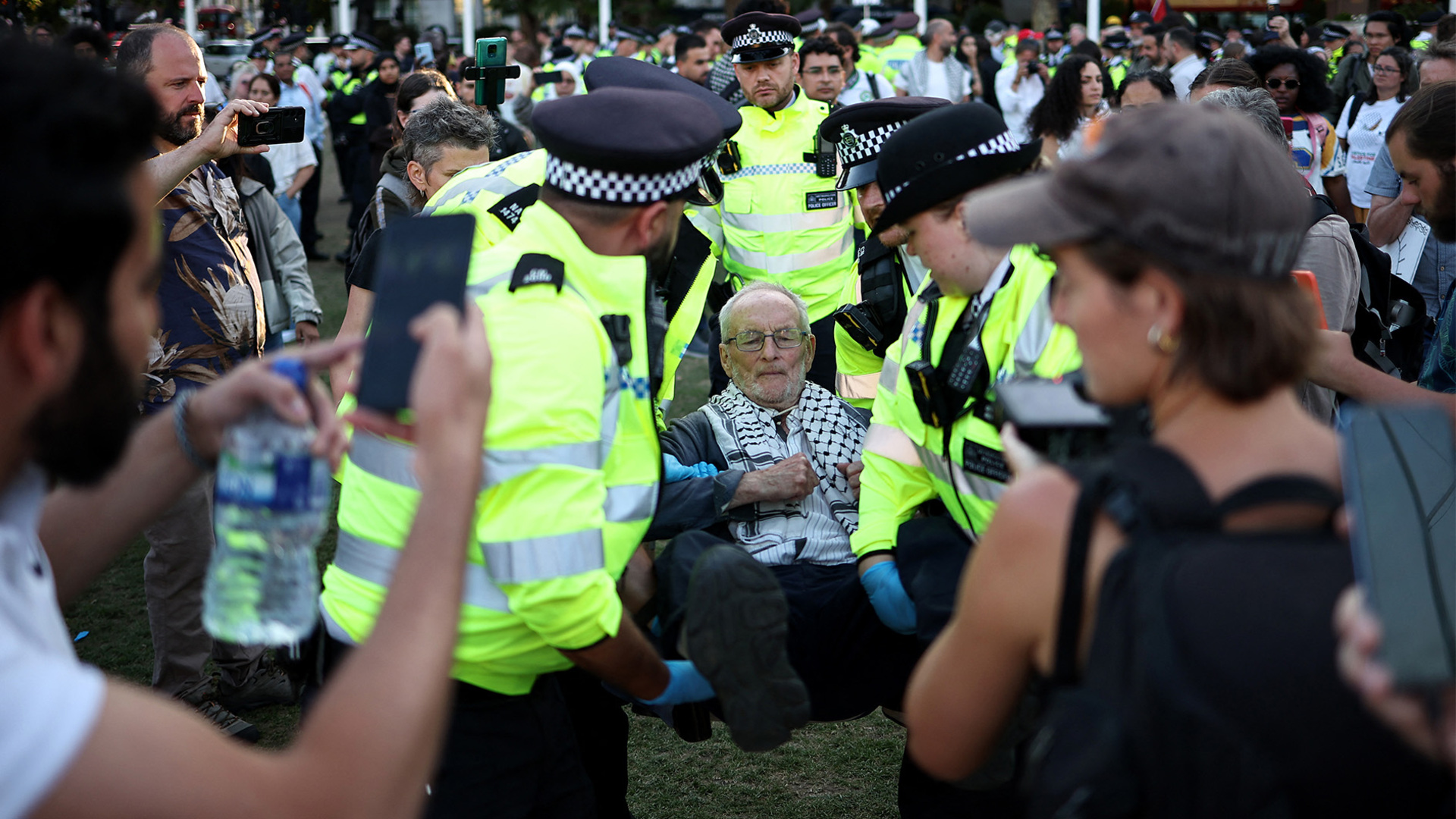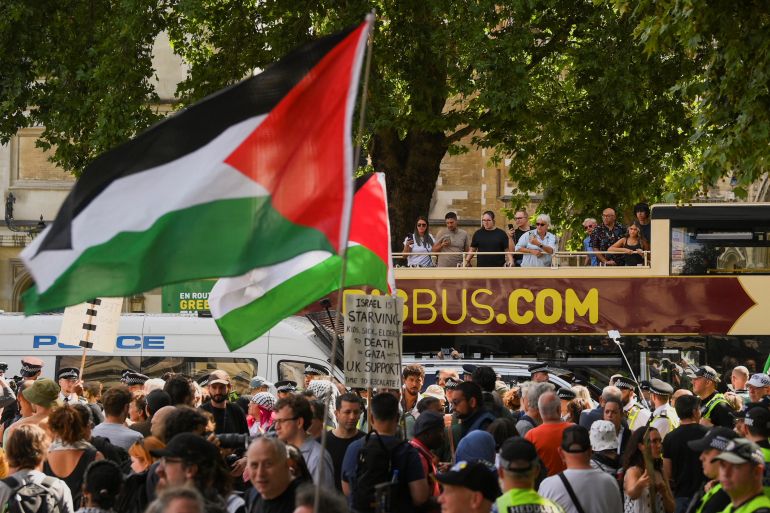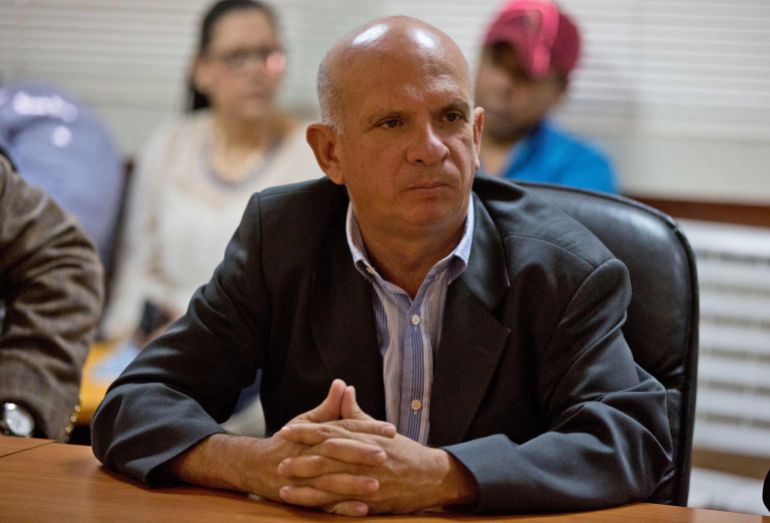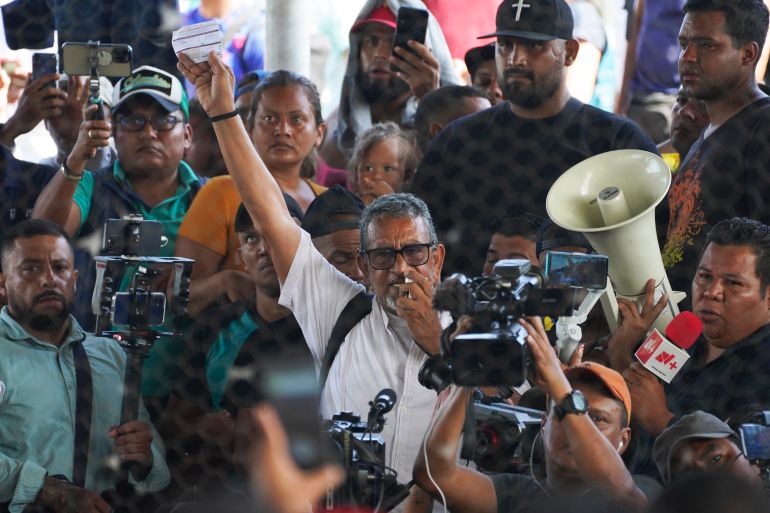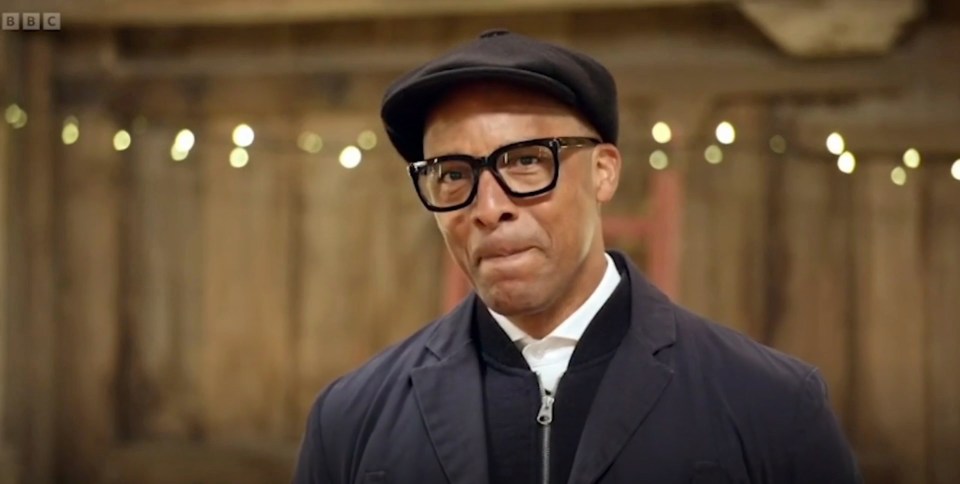There is a new reality emerging in the parking lots of one of America’s biggest home improvement stores, highlighted by incidents big and small across Los Angeles.
Construction workers are still hauling lumber and nails, and DIY homeowners pushing carts of paint and soil. But all of a sudden, federal immigration agents may appear.
On Thursday, they moved on a Home Depot parking lot in Monrovia, sending laborers running, including a man who jumped a wall and onto the 210 Freeway, where he was fatally struck. A day prior, fear of a possible raid at a Ladera Ranch location sparked warnings across social media.
Since a federal judge issued a temporary restraining order prohibiting federal agents from targeting people solely based on their race, language, vocation, or location, the number of arrests in Southern California declined in July.
But over the last two weeks, some higher-profile raids have returned, often taking place at Home Depot locations, where migrant laborers often congregate looking for work.
The number of arrests in these incidents was not immediately known, but the fear that pervades the sweeps underscores how Home Depot has emerged this summer as a key battleground in the fight over immigration enforcement in Los Angeles and Southern California.
“Home Depot, whether they like it or not, they are the epicenter of raids,” said Pablo Alvarado, the co-executive director of the National Day Laborer Organizing Network, a group that represents the tens of thousands of day laborers working in L.A.
The renewed burst of raids outside neighborhood Home Depots began Aug. 6, when a man drove a Penske moving truck to a Home Depot in Westlake and began soliciting day laborers when, all of a sudden, Border Patrol agents jumped out of the back of the vehicle and began to chase people down. Sixteen people were arrested.
The raid — branded “Operation Trojan House” by the Trump administration — was showcased by government officials with footage from an embedded Fox News TV crew. “For those who thought Immigration enforcement had stopped in Southern California, think again,” acting U.S. Atty. Bill Essayli posted on X.
The next day, federal agents raided a Home Depot in San Bernardino. Then, on Aug. 8, they conducted two raids outside a Home Depot in Van Nuys in what DHS described as a “targeted immigration raid” that resulted in the arrest of seven undocumented immigrants from Guatemala, Honduras and Mexico.
Over the weekend, activists say, a Home Depot was targeted in Cypress Park and word spread that federal agents were at a Home Depot in Marina del Rey. On Monday, day laborers were nabbed outside a Home Depot in North Hollywood, and on Tuesday more were arrested at a Home Depot in Inglewood.
“And it’s not just day laborers they are taking,” Alvarado added, noting that when federal agents descend on the hardware store’s parking lots, they question anyone who looks Latino or appears to be an immigrant and ask them about their papers. “They also get customers of Home Depot who look like day laborers, who speak Spanish.”
The national hardware chain — whose parking lots have for decades been an unofficial gathering point for undocumented laborers hoping to get hired for a day of home repair or construction work — was one of the first sites of the L.A. raids in June that kicked off the Trump administration’s intense immigration enforcement across Southern California.
Nearly 3,000 people across seven counties in L.A. were arrested in June as masked federal agents conducted roving patrols, conducting a chaotic series of sweeps of street corners, bus stops, warehouses, farms, car washes and Home Depots. But the number of raids and arrests plummeted dramatically across L.A. in mid-July after the court order blocked federal agents across the region from targeting people unless they had reasonable suspicion they entered the country illegally.
On Aug. 1, the 9th U.S. Circuit Court of Appeals denied the Trump administration’s request to lift the restraining order prohibiting roving raids. But within just a few days, federal agents were back, raiding the Westlake Home Depot.
“Even though we’ve had two successful court decisions, the administration continues with their unconstitutional behavior coming and going to Home Depot stores,” L.A. Mayor Karen Bass said at a news conference Thursday. “They are violating the” temporary restraining order.
Advocates for undocumented immigrants question the legality of federal agents’ practices. In many cases, they say, agents are failing to show judicial warrants. They argue that the way agents are targeting day laborers and other brown-skinned people is illegal.
“It’s clear racial profiling,” said Alvarado.
The Department of Homeland Security did not answer questions from The Times about how many people have been arrested over the last week at Home Depots across L.A. or explain what why the agency has resumed raids outside hardware stores.
After last Friday’s raids on Van Nuys, Homeland Security spokesperson Tricia McLaughlin said four of the seven individuals arrested had criminal records, including driving under the influence of alcohol, disorderly conduct and failing to adhere to previous removal orders. She dismissed activists’ claims that the Trump administration were violating the temporary restraining order.
“What makes someone a target for immigration enforcement is if they are illegally in the U.S. — not their skin color, race, or ethnicity,” McLaughlin said. “America’s brave men and women are removing murderers, MS-13 gang members, pedophiles, rapists — truly the worst of the worst from Golden State communities.”
Activists say that federal agents are targeting Home Depots because they are hubs for a constant flow of day laborers — mostly Latino and a great deal of whom are undocumented.
“They know that at the Home Depot there will always be people who are day laborers, many of them undocumented,” said Ron Gochez, a member of the Unión del Barrio, a group that patrols neighborhoods to alert residents of immigration sweeps. “And so they figured it would be a much easier, faster and more effective way for them to kidnap people just to go to the Home Depot.”
Another reason the hardware store parking lots had become a focal point, Gochez said, is that they present a wide, open space to hunt people down.
“There’s nowhere to run, nowhere to hide,” Gochez said. “And when some of the day laborers started running inside of the Home Depot stores, the agents literally have chased them down the aisles of the store.”
In Los Angeles, pressure is mounting on Home Depot to speak out against the targeting of people outside their stores.
“They haven’t spoken out; their customers are being taken away and they are not saying anything,” Alvarado said. “They haven’t issued a public condemnation of the fact that their customers have been abducted in their premises.”
This is not the first time Home Depot has found itself in the center of a political firestorm.
In 2019, the Atlanta-based company faced boycott campaigns after its co-founder Bernie Marcus, a Republican megadonor, announced his support for Trump’s reelection campaign. Back then, the chain tried to distance itself from its founder, noting that Marcus retired from the company in 2002 and did not speak on its behalf.
But in a global city like L.A., where civic and political leaders are rallying against the raids and public schools have developed policies blocking federal agents from entering their premises, there are growing calls for the national hardware chain to develop consistent policies on raids, such as demanding federal agents have judicial warrants before descending on their lots.
On Tuesday, a coalition of advocacy groups led a protest in MacArthur Park and urged Angelenos to support a 24-hour boycott of Home Depot and other businesses that they say have not stopped federal immigration agents from conducting raids in their parking lots or chasing people down in their stores.
“We call them an accomplice to these raids, because there is no other location that’s been hit as much as they have,” Gochez said. “We think that Home Depot is being complicit. They’re actually, we think, in some way collaborating, whether directly or not.”
Home Depot denies that it is working with federal agents or has advance notice of federal immigration enforcement activities.
“That’s not true,” George Lane, manager of corporate communications for Home Depot, said in an email to The Times. “We aren’t notified that these activities are going to happen, and we aren’t involved in the operations. We’re required to follow all federal and local rules and regulations in every market where we operate.”
Lane said Home Depot asked associates to report any suspected immigration enforcement operations immediately and not to engage for their own safety.
“If associates feel uncomfortable after witnessing ICE activity,” he added, “we offer them the flexibility they need to take care of themselves and their families.”
The targeting of day laborers outside L.A. Home Depots is particularly contentious because day laborers, primarily Latino men, have for decades represented an integral part of the Los Angeles labor force.
Since the 1960s, day laborers have formed an informal labor market that has boosted this sprawling city, helping it expand, and in recent months they have played a pivotal role in rebuilding L.A. after the January firestorms tore through Pacific Palisades and Altadena destroying thousands of homes.
“It appears they’re targeting and taking the very people rebuilding our cities,” Alvarado said. “Without migrant labor, both documented and undocumented, it’s impossible to try to rebuild Los Angeles.”
In many L.A. neighborhoods, day laborers are such a constant, ingrained presence at Home Depots that the city’s Economic and Workforce Development Department sets up its resource centers for day laborers next to the stores.
Day laborers are also a reason many customers come to Home Depot.
“Day laborers are a part of their business model,” Alvarado said. “You come in, you get your materials, and then you get your helper.”
Alvaro M. Huerta, the Director of Litigation and Advocacy of the Immigrant Defenders Law Center, part of a coalition of groups suing Homeland Security over immigration raids in L.A., said the pick up of raids at Home Depot parking lots was “deeply troubling” and raised serious concerns that the federal government was continuing to violate the July temporary restraining order.
“This looks a lot like it did before a temporary restraining order was in place,” Huerta said.“My sense is they feel they can justify raids at Home Depots more than roving raids.”
Lawyers, Huerta said, were investigating the raids and asking some of the people taken into custody a series of questions: Did agents ever present a warrant? What kinds of questions did they ask? Did you feel like you were able to leave?
“One of the things we’ve been arguing is that some of these situations are coercive,” Huerta said. “The government is saying, ‘No, we’re allowed to ask questions, and people can volunteer answers.’ But we’ve argued that in many of these cases, people don’t feel like they cannot speak.”
Attorneys will likely present information about the arrests to court at a preliminary injunction hearing in September, Huerta said, as they press Trump administration attorneys for evidence that the arrests are targeted.
Huerta said some of the people caught up in recent Home Depot raids were not even looking for work at the parking lot.
One man, a 22-year-old who was getting gas across the street from a Home Dept last Thursday, Huerta said, was detained even though he had special immigrant juvenile status as he was brought to the U.S. as a teen. The man had an asylum application pending, work authorization and no criminal history — and yet a week after he was arrested he was confined in Adelanto Detention Center.
Times staff writer Julia Wick contributed to this article.
